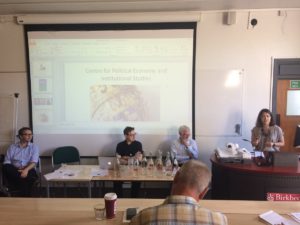When: 20 March 2018, 13:00 — 17:00
Venue: Room 101, 30 Russell Square, Birkbeck College, University of London, WC1B 5DT
Booking details: Free entry; booking recommended
The most complex economic challenges of our time – such as ageing population, climate change, the effects of automation and globalisation – result from interlinked scientific, technical, social and individual processes, a comprehensive understanding and addressing of which require interdisciplinary approaches. Besides addressing complex challenges, interdisciplinary research is also particularly likely to produce radically novel outcomes that create innovation opportunities. Policymakers advocate greater interdisciplinarity within academia, calling for more interdisciplinary research centres, for greater funding of interdisciplinary research, and for better ways to map and measure interdisciplinary engagement and outputs.
However, universities are historically not well equipped to support interdisciplinary research, and the incentive systems that underpin most academic activities – including funding, evaluation, academic communication, publishing and career progression – militate against it. Institutions that wish to encourage more interdisciplinarity need to implement adequate initiatives to support it. This workshop intends to bring together experts engaged in the practice, study and evaluation of interdisciplinary research, in order to uncover challenges and best practices in supporting interdisciplinarity within academia.
Tickets can be booked through Eventbrite
For more information please contact either Dr Federica Rossi (f.rossi@bbk.ac.uk) or Dr Luca Andriani (luca.andriani@bbk.ac.uk).
Workshop programme:
1.00-1.30: Sandwich lunch
1:30-1:45 Introduction, prof. Julian Swann, Pro-Vice Master for Research, Birkbeck
1.45-2.45: Panel 1: Running an interdisciplinary research centre: advantages and challenges
Catherine Griffiths, Programme and Research Development Manager, Birkbeck, and Birkbeck Institute for Data Analytics
Prof Susan Michie, Director, Centre for Behavioural Change, UCL
Prof Jacqueline Rose, Co-Director, Birkbeck Institute for the Humanities
Chair: Dr Luca Andriani (Centre for Political Economy and Institutional Studies)
2.45-3.45: Panel 2: What does good interdisciplinary research look like? Views from research evaluators
Dr Lisa Mooney, Pro-Vice Chancellor for Research and Knowledge Exchange, University of East London, and REF Interdisciplinary Research Advisory panel
Prof. Andrew Pettigrew, OBE, Birkbeck, University of London and University of Oxford
Dr Rachael Kiddey, Assistant editor, Independent Social Research Foundation
Chair: Dr Federica Rossi (Centre for Innovation Management Research)
3:45-4:00 Coffee break
4.00-5.00: Concluding session: Implications for research centres
Dr Sappho Xenakis, Assistant Dean for Research, Birkbeck School of Law
Prof Alex Poulovassilis, Deputy Dean for Research Enhancement, Birkbeck School of Business, Economics and Informatics
Dr Peter Zusi, Director, FRINGE Centre, UCL


 The School of Law, Birkbeck are pleased to hold a workshop to exchange perspectives on the interaction of critical legal theory and political economy in relation to international economic law.
The School of Law, Birkbeck are pleased to hold a workshop to exchange perspectives on the interaction of critical legal theory and political economy in relation to international economic law.
 A half-day conference on “Why Political Economy and Institutional Studies?” will be taking place on Thursday 15 June at Birkbeck University of London to mark the launch of the Centre for Political Economy and Institutional Studies. With contributions from leading scholars from universities across the UK, the event will be a unique opportunity for reflection on the significance of political economy and institutions. Further details of the event are available
A half-day conference on “Why Political Economy and Institutional Studies?” will be taking place on Thursday 15 June at Birkbeck University of London to mark the launch of the Centre for Political Economy and Institutional Studies. With contributions from leading scholars from universities across the UK, the event will be a unique opportunity for reflection on the significance of political economy and institutions. Further details of the event are available 
